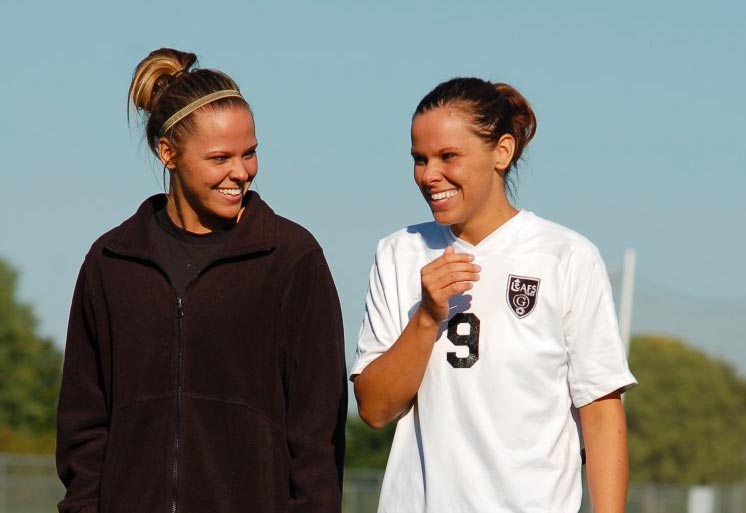On Super Bowl Sunday 2020, Goshen College graduate Katie Sowers will make history as the first woman and the first openly gay coach to appear at the Super Bowl. 11 years ago, Goshen College denied Sowers a volunteer coaching position on the basis of her sexual orientation.
An official apology released by Goshen College President Rebecca Stoltzfus last week acknowledged the denial and has sparked conversations about the college’s past and present policies related to supporting LGBTQ+ students and faculty.Sowers, who attended Goshen after transferring from Hesston College, played basketball for the Maple Leafs. After she graduated, Sowers applied for an assistant coaching position at the college.
The basketball coach, who no longer works for the college, denied her the position, citing the concerns of parents who didn’t want their children working with a gay coach. In November, Sowers shared her story in an interview with NBC Sports Bay Area, noting that while the rejection devastated her, it did not deter her from pursuing her dream career.
In 2009, Goshen College, as well as the state of Indiana, allowed for hiring decisions to consider sexual orientation. The school updated to a non-discrimination policy in 2015, in response to campaigns by the GC community.
Last Wednesday, Goshen College President Rebecca Stoltzfus released a statement responding to the discrimination Sowers faced while applying for employment at the college.
In the statement, Stoltzfus expressed pride in Sowers’ accomplishments and character and apologized on behalf of the institution. She also shared the updated hiring policy, which states, “Being rooted in the way of Jesus, we will seek an inclusive community and transformative justice in all we do.”
“While we cannot go back and change history, justice calls us to stand up now and say that the way Goshen College treated Katie’s offer to coach was hurtful and wrong,” Stoltzfus wrote. “I express on behalf of the institution our profound apologies to Katie Sowers and to all others who have not been welcomed here simply because of who they are.”
On Sunday, NBC Sports Bay Area published a follow-up article, which included Sowers’ response to the statement.
“I loved my time at Goshen and I love everything Goshen College represents,” Sowers said. “This moment was tough, but the reality is we all experience rejection and adversity in our lives. When, not if, we go through these moments of adversity, we can view them as roadblocks and feel sorry for ourselves, or we can view them as part of our story. I prefer to see what happened to me as a detour that put me on a path to where I am now.”
Stoltzfus also reached out privately to Sowers, to send a personal apology. Sowers’ story presented a moment for the institution to take a step forward in reconciling the past.
“The long-standing hurts of past policies and actions weigh heavily for me and many others at GC,” said Stoltzfus. “I have had personal conversations with numerous people about their painful experiences from our community in the past and present. Many steps will be needed to reconcile this legacy.”
On Facebook, some commenters responded to the president’s statement, expressing concerns with the statement and the College’s past and present actions. Some were frustrated that Goshen college didn’t release an official apology until Sowers received public acclaim for her position as an NFL coach, and others said the statement’s mention of the Indiana employment discrimination law was an effort to shift blame away from the college.
When asked about the comments regarding the state law, Stoltzfus said that was not the intention and that the institution takes full responsibility for their previous non-inclusive policies.
“The statement about the Indiana law was included to give historical context,” said Stoltzufs. “We recognize that just because something is legal does not always make it right or just.”
Stoltzfus also said that, in recent years, the college has worked to offer more support to LGBTQ+ students.
She cited a new partnership with Mosaic Health and Healing Arts, an inclusive medical facility based in Goshen. Last year, two Goshen College choirs changed their names to become more gender-inclusive.
Additionally, all employees are required to complete non-discrimination training, Stoltzfus said. LGBTQ+ employees are now entitled to the same benefits and policies as all other employees and can file a grievance in response to policy violations. Stoltzfus also said that resources are being allocated to become a more inclusive community.
“An individual director/supervisor can’t discriminate and have the support of (or silence of) the institution in that anymore,” Stoltzfus said in an email.
Most responses to the public statement has been positive as those connected to the GC community acknowledge progress being made, but a few critical Facebook comments point to deep frustrations among some Goshen College graduates with the way the college has handled and continues to handle support for LGBTQ+ students and faculty.
“As Dr. King said, the moral arc of the universe is long. The statement made last week is one small bend in that trajectory,” Stoltzfus said. “There will be many more steps, day by day, as we live into our vision statement. I hope that at some point in the future Katie Sowers can return to campus so that we can more formally celebrate her many accomplishments, and also so our current students can hear more about her powerful personal and professional journey.”



